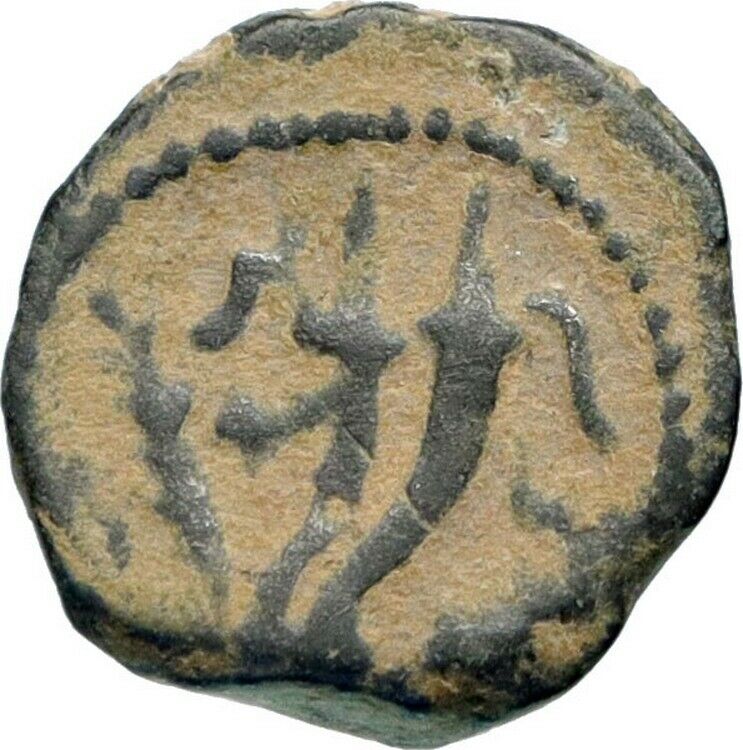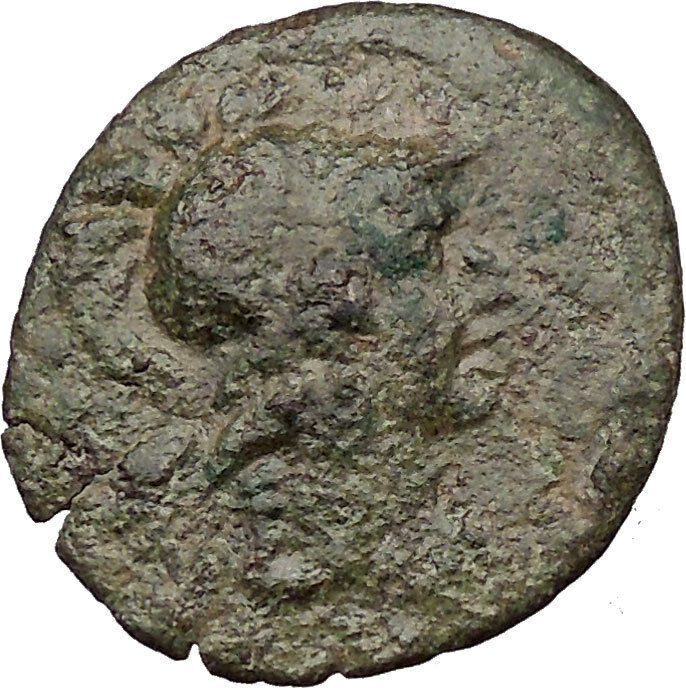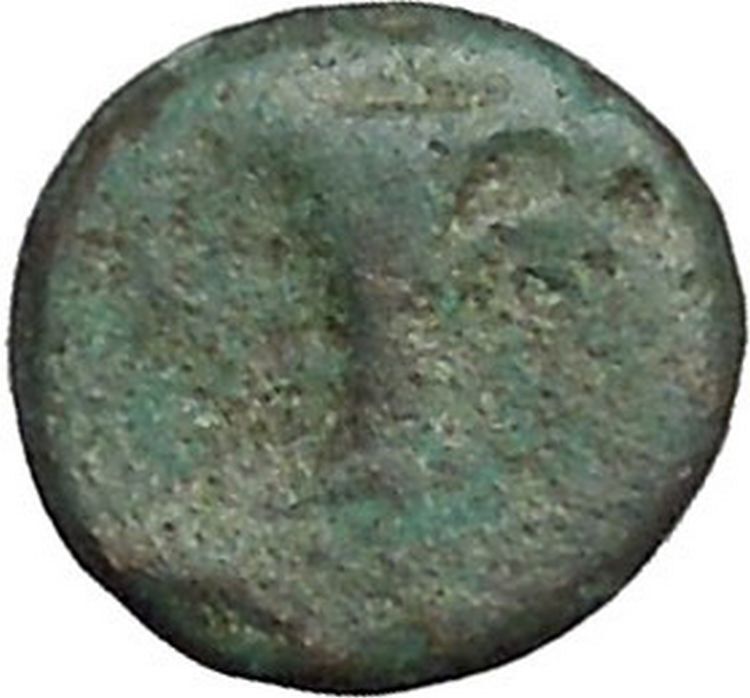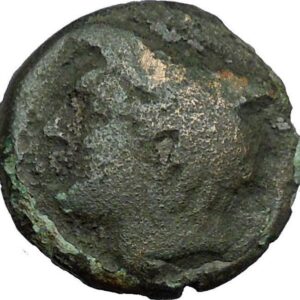|
Herod Archelaus – Jewish King: 4 B.C. – 6 A.D.
(Ethnarch over Judaea, Samaria and Idumaea) (Son of Herod the Great)
Bronze Half-Prutah 15mm (1.07 grams) Jerusalem mint, struck circa 4 B.C. – 6 A.D.
Reference: Hendin 1197 (5th Edition)
HPW; prow of galley facing left.
ЄΘN within wreath.
But when he heard that Archelaus did reign in Judaea in the room of his father Herod, he was afraid to go thither… (Matthew 2:22).
You are bidding on the exact item pictured, provided with a Certificate of Authenticity and Lifetime Guarantee of Authenticity.
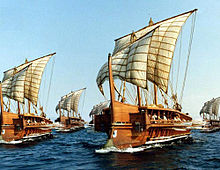 A galley is a type of ship propelled by rowers that originated in the eastern Mediterranean Sea and was used for warfare, trade and piracy from the first millennium BC. Galleys dominated naval warfare in the Mediterranean from the 8th century BC until development of advanced sailing warships in the 17th century. Galleys fought in the wars of Assyria, ancient Phoenicia, Greece, Carthage and Rome until the 4th century AD. After the fall of the Western Roman Empire galleys formed the mainstay of the Byzantine navy and other navies of successors of the Roman Empire, as well as new Muslim navies. Medieval Mediterranean states, notably the Italian maritime republics, including Venice, Pisa, Genoa and the Ottoman Empire relied on them as the primary warships of their fleets until the 17th century, when they were gradually replaced by sailing warships. Galleys continued to be applied in minor roles in the Mediterranean and the Baltic Sea even after the introduction of steam propelled ships in the early 19th century. A galley is a type of ship propelled by rowers that originated in the eastern Mediterranean Sea and was used for warfare, trade and piracy from the first millennium BC. Galleys dominated naval warfare in the Mediterranean from the 8th century BC until development of advanced sailing warships in the 17th century. Galleys fought in the wars of Assyria, ancient Phoenicia, Greece, Carthage and Rome until the 4th century AD. After the fall of the Western Roman Empire galleys formed the mainstay of the Byzantine navy and other navies of successors of the Roman Empire, as well as new Muslim navies. Medieval Mediterranean states, notably the Italian maritime republics, including Venice, Pisa, Genoa and the Ottoman Empire relied on them as the primary warships of their fleets until the 17th century, when they were gradually replaced by sailing warships. Galleys continued to be applied in minor roles in the Mediterranean and the Baltic Sea even after the introduction of steam propelled ships in the early 19th century.
The galley engagements at Actium and Lepanto are among the greatest naval battles in history.
Herod Archelaus (23 BC – c. 18 AD) was the ethnarch of Samaria, Judea, and Edom from 4 BC to 6 AD. He was the son of Herod the Great and Malthace, the brother of Herod Antipas, and the half-brother of Herod Philip I.
 Archelaus received the kingdom of Judea by the last will of his father, though a previous will had bequeathed it to his brother Antipas. He was proclaimed king by the army, but declined to assume the title until he had submitted his claims to Caesar Augustus in Rome. Before setting out, he quelled with the utmost cruelty a sedition of the Pharisees, slaying nearly three thousand of them. In Rome he was opposed by Antipas and by many of the Jews, who feared his cruelty; but in 4 BC Augustus allotted to him the greater part of the kingdom (Samaria, Judea, and Idumea) with the title of ethnarch until 6 AD when Judaea province was brought under direct Roman rule at the time of the Census of Quirinius. Archelaus received the kingdom of Judea by the last will of his father, though a previous will had bequeathed it to his brother Antipas. He was proclaimed king by the army, but declined to assume the title until he had submitted his claims to Caesar Augustus in Rome. Before setting out, he quelled with the utmost cruelty a sedition of the Pharisees, slaying nearly three thousand of them. In Rome he was opposed by Antipas and by many of the Jews, who feared his cruelty; but in 4 BC Augustus allotted to him the greater part of the kingdom (Samaria, Judea, and Idumea) with the title of ethnarch until 6 AD when Judaea province was brought under direct Roman rule at the time of the Census of Quirinius.
The first wife of Archelaus is given by Josephus simply as Mariamne, perhaps Mariamne III (Mariamne bint Aristobulus), whom he divorced to marry Glaphyra. She was the widow of Archelaus’ brother Alexander, though her second husband, Juba, king of Mauretania, was alive. This violation of the Mosaic law along with Archelaus’ continued cruelty roused the ire of the Jews, who complained to Augustus. Archelaus was deposed in the year 6 and banished to Vienne in Gaul; Samaria, Judea proper, and Idumea became the Roman province of Iudaea.
In the Bible, Archelaus is mentioned in the Gospel of Matthew. According to Matthew 2:13-23, Joseph, Mary and Jesus fled to Egypt to avoid the Massacre of the Innocents. When Herod the Great died, Joseph was told by an angel in a dream to return to Israel (presumably to Bethlehem). However, upon hearing that Archelaus had succeeded his father as ruler of Judaea he “was afraid to go thither” (Matthew 2:22), and was again notified in a dream to go to Galilee. This is Matthew’s explanation of why Jesus was born in Bethlehem in Judea but grew up in Nazareth.
The beginning and conclusion of Christ’s Parable of the minas in the Gospel of Luke may refer to Archelaus’s journey to Rome, in that Jesus’ parables and preaching often made use of events familiar to the people as examples for bringing his spiritual lessons to life:
“A nobleman went into a far country to receive for himself a kingdom and then return…But his citizens hated him and sent a delegation after him, saying, ‘We do not want this man to reign over us.’… ‘But as for these enemies of mine,’ [said the nobleman] ‘who did not want me to reign over them, bring them here and slaughter them before me.'” (Luke 19:12, 19:14, 19:27)
|





 A galley is a type of ship propelled by rowers that originated in the eastern Mediterranean Sea and was used for warfare, trade and piracy from the first millennium BC. Galleys dominated naval warfare in the Mediterranean from the 8th century BC until development of advanced sailing warships in the 17th century. Galleys fought in the wars of Assyria, ancient Phoenicia, Greece, Carthage and Rome until the 4th century AD. After the fall of the Western Roman Empire galleys formed the mainstay of the Byzantine navy and other navies of successors of the Roman Empire, as well as new Muslim navies. Medieval Mediterranean states, notably the Italian maritime republics, including Venice, Pisa, Genoa and the Ottoman Empire relied on them as the primary warships of their fleets until the 17th century, when they were gradually replaced by sailing warships. Galleys continued to be applied in minor roles in the Mediterranean and the Baltic Sea even after the introduction of steam propelled ships in the early 19th century.
A galley is a type of ship propelled by rowers that originated in the eastern Mediterranean Sea and was used for warfare, trade and piracy from the first millennium BC. Galleys dominated naval warfare in the Mediterranean from the 8th century BC until development of advanced sailing warships in the 17th century. Galleys fought in the wars of Assyria, ancient Phoenicia, Greece, Carthage and Rome until the 4th century AD. After the fall of the Western Roman Empire galleys formed the mainstay of the Byzantine navy and other navies of successors of the Roman Empire, as well as new Muslim navies. Medieval Mediterranean states, notably the Italian maritime republics, including Venice, Pisa, Genoa and the Ottoman Empire relied on them as the primary warships of their fleets until the 17th century, when they were gradually replaced by sailing warships. Galleys continued to be applied in minor roles in the Mediterranean and the Baltic Sea even after the introduction of steam propelled ships in the early 19th century. Archelaus received the kingdom of Judea by the last will of his father, though a previous will had bequeathed it to his brother Antipas. He was proclaimed king by the army, but declined to assume the title until he had submitted his claims to Caesar Augustus in Rome. Before setting out, he quelled with the utmost cruelty a sedition of the Pharisees, slaying nearly three thousand of them. In Rome he was opposed by Antipas and by many of the Jews, who feared his cruelty; but in 4 BC Augustus allotted to him the greater part of the kingdom (Samaria, Judea, and Idumea) with the title of ethnarch until 6 AD when Judaea province was brought under direct Roman rule at the time of the Census of Quirinius.
Archelaus received the kingdom of Judea by the last will of his father, though a previous will had bequeathed it to his brother Antipas. He was proclaimed king by the army, but declined to assume the title until he had submitted his claims to Caesar Augustus in Rome. Before setting out, he quelled with the utmost cruelty a sedition of the Pharisees, slaying nearly three thousand of them. In Rome he was opposed by Antipas and by many of the Jews, who feared his cruelty; but in 4 BC Augustus allotted to him the greater part of the kingdom (Samaria, Judea, and Idumea) with the title of ethnarch until 6 AD when Judaea province was brought under direct Roman rule at the time of the Census of Quirinius.

